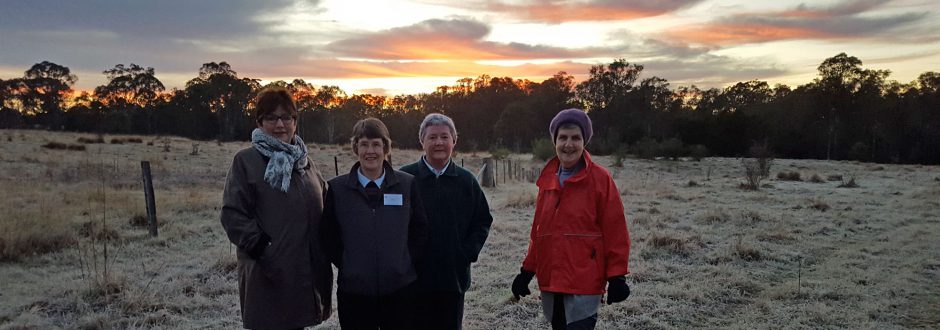It’s National Science Week here in Australia and it’s often suggested that science and religion don’t mix. Not so for the Sisters of the Good Samaritan who last month hosted an educational experience for their sisters, oblates and partners in ministry, to explore key aspects of the science and theology of creation.
The weekend of “study, reflection and conversation”, held at the Edmund Rice Education and Conference Centre at Mulgoa, a rural-bush setting at the foothills of the Blue Mountains, west of Sydney, focused on the theme “Air, water and creation commitment”.
Good Samaritan Sister Catherine McCahill, one of the organisers, said the organising team chose to focus on air and water because “the health and preservation of these two essential elements is critical to the ecology of our planet”.
“As a congregation we are concerned about climate change and the long-term human impact on the climate. Our Sisters in Kiribati are acutely aware of this impact,” she said.
“The activities of humans are impacting on our air and water, and are undoubtedly contributing to climate change.”
Christian Brother Kevin McDonnell, an educator and scripture scholar who has a doctorate in geology, facilitated the program for the weekend.
“His teaching provided us with an opportunity to understand the science of the natural cycles of air and water, and the impact of human activity on these cycles,” explained Catherine.
She said the group was also fortunate to have three “committed environmentalists” as guest speakers. Professor Neil Ormerod, from Australian Catholic University provided a “comprehensive overview” of Pope Francis’ encyclical Laudato Si’, Thea Ormerod, President of Australian Religious Response to Climate Change, outlined practical ways “to act positively for the environment”, while Anne Lanyon, Coordinator of the Faith Ecology Network, led the group in theological reflection.
The group also visited the Hawkesbury Institute for the Environment near Richmond, to learn about the unique work of EucFACE, an international research project that is measuring the impact of rising carbon dioxide levels on native forest.
“There is nothing like seeing something first-hand,” said Catherine. “I think we will all remember this aspect of the weekend.”
Among the 24 participants who travelled from different parts of Australia, including two Good Samaritan Sisters from Japan, was Good Samaritan Oblate Pat O’Gorman, from Wollongong.
“I thought this weekend would be a good opportunity for my own continued formation within a critical area demanding much theological reflection and action on behalf of creation,” she said.
Pat said the program was “very full with a good balance of information from a variety of presenters”, but she “particularly liked the solid input around the science of climate change” and “bringing together” science and theology in a “thought-provoking and challenging way”.
As a result of the experience, Pat has recommitted herself to be “diligent about recycling and reusing things”, and reducing her overall footprint.
“I had been planning to investigate getting solar panels for my house in the next five years. I now plan to work to bring that forward to the next two years.
“I also plan to be more politically active in advocating for environmental issues in my local area,” she said.
Sister Diana Law from Gympie in Queensland described the weekend experience as “uplifting”.
For Diana, the best aspect of the weekend was the “union of hearts and minds in a shared focus on the mutual interconnectedness of the whole of creation, which ‘groans towards completion in Christ’ (Romans 8:22)”.
Diana said she endeavours to share her experience with “as many people as possible”.
“I will foster tiny-scale, similar experiences to enable a trickling of this transformative scientific theology,” she explained.
Last month’s experience at Mulgoa is one of a number of initiatives of the Good Samaritan Sisters, demonstrating their ongoing commitment to the care of creation, expressed explicitly in their 2011 chapter vision statement.
Perhaps the most significant of these initiatives is the Wivenhoe Conservation Project at Camden, on Sydney’s southern outskirts, where ground-breaking work is underway to restore the endangered Cumberland Woodland ecosystem.
However, one of the objectives of the Mulgoa weekend was to explore what more the congregation could be doing in this vital area.
Sister Catherine McCahill said each of the participants was asked to offer their suggestions about other initiatives the congregation could explore.
“We are still working through these. They provide some strong impetus for us as a congregation to continue some of our commitments and to make some others, individually and collectively,” she said.
